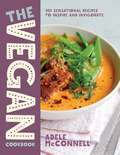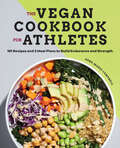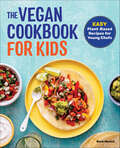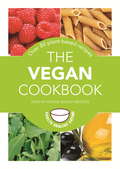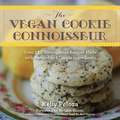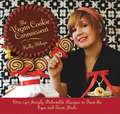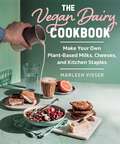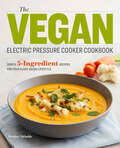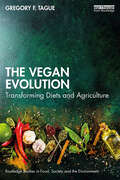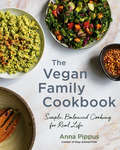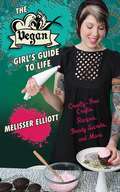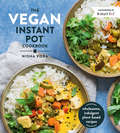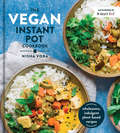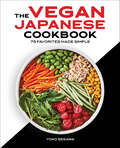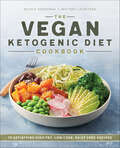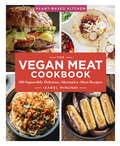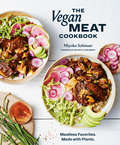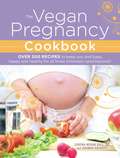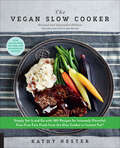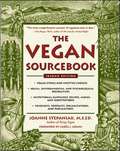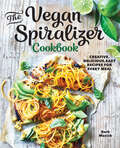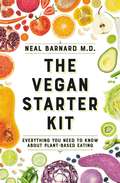- Table View
- List View
The Vegan Cookbook
by Adele McconnelAdele McConnell brings a fresh, inspired look to plant-based food, showing just how satisfying, dynamic and undeniably delicious contemporary vegan cooking can be. The beautifully photographed recipes make the most of a wide variety of fresh ingredients, drawing inspiration from cuisines around the world to help you create healthy, balanced meals effortlessly. McConnell proves once and for all that there's no need to sacrifice flavor to eat animal-free. She creates her stylish, mouth-watering dishes with innovative techniques and nutrient-packed ingredients, including whole grains and protein sources such as pulses, nuts, tempeh and tofu. From Mushroom & Roasted Beetroot Polenta Nests to Chinese Spring Onion Pancakes with Ginger Dipping Sauce, you'll find dishes that will tempt both part-time and fully-committed vegans alike. Complete with 100 inspiring, easy-to-follow recipes, The Vegan Cookbook isn't merely about creating great meat-free food, it's about producing sensational dishes everyone will want to make time and time again.
The Vegan Cookbook for Athletes: 101 Recipes and 3 Meal Plans to Build Endurance and Strength
by Anne-Marie CampbellIncrease performance with 101 plant-based meals for athletes Being an athlete means always striving for ways to get the most out of your body, and eating vegan is a great way to build endurance and strength while improving overall health. Featuring 101 recipes and 3 meal plans, this is one of the most informative vegan cookbooks and will show you how impactful combining your training with solid plant-based macronutrient resources can be—no matter your athletic level. Whether you're a committed vegan or just starting out, you can create a tailored nutrition plan for your unique athletic demands. Whether it's learning how to balance carbohydrates, fats, and proteins or eliminating cooking oil, this dietary guide helps set you up for a life of athletic success. This top choice among vegan recipe books includes: Macros overview—Discover key information about macronutrients that caters to a variety of athletic needs. Quick recipes—Choose from 100+ recipes using common ingredients that can be made in advance for on-the-go eating. Meal plan options—Use the meal plans alone or together so you can get the customized nutrition for your athletic requirements. Keep yourself fit and active with this guide to going vegan for athletes.
The Vegan Cookbook for Kids: Easy Plant-Based Recipes for Young Chefs
by Barb MusickEasy, tasty vegan recipes for young chefs ages 8-12Kids in the kitchen know how to have fun—and eat well, too! Have a blast cooking (and devouring) delicious meals with The Vegan Cookbook for Kids. This kids cookbook is packed with easy-to-follow recipes for flavorful vegan food. Now you can create scrumptious vegan meals with your own two hands—and share them with your family and friends!This kids cookbook starts by teaching you about common plant-based ingredients, essential kitchen tools, and cooking safety guidelines. Get more comfortable in the kitchen as you cook with tips and ideas to help you become a better chef. Plus, you'll keep it simple with the recipes in this kids cookbook—they use mostly easy-to-find, inexpensive ingredients.Dig into a kids cookbook that has:50 Yummy recipes—Dish out a variety of recipes, like Cinnamon Swirl Pancakes, Creamy Buffalo Cauliflower Dip, Fruity Spinach Salad, Enchilada Casserole, and lots more!Vegan adventures—This kids cookbook includes dishes from different cuisines, so you can explore which foods and flavors you like best.Kitchen know-how—Brush up on skills like accurate measuring, safe chopping and slicing, food prepping, and even tofu preparation.Are you hungry yet? Get cooking with this fun, easy plant-based kids cookbook!
The Vegan Cookbook: Over 80 plant-based recipes
by Yvonne Bishop-Weston Tony Bishop-WestonThe number of vegans is growing all the time as more and more non-vegans adopt a vegan diet for a healthier lifestyle. The Vegan Cookbook contains over 90 recipes for healthy and delicious meals without any meat, fish or animal produce. It also provides important nutritional information and all the essential knowledge needed to understand this ever-popular lifestyle choice.
The Vegan Cookbook: Over 80 plant-based recipes
by Yvonne Bishop-Weston Tony Bishop-WestonThe number of vegans is growing all the time as more and more non-vegans adopt a vegan diet for a healthier lifestyle. The Vegan Cookbook contains over 90 recipes for healthy and delicious meals without any meat, fish or animal produce. It also provides important nutritional information and all the essential knowledge needed to understand this ever-popular lifestyle choice.
The Vegan Cookie Connoisseur: Over 120 Scrumptious Recipes Made with Natural and Simple Ingredients
by Kelly Peloza Natalie SlaterKelly Peloza started experimenting with vegan baking as a high school student, blogging about her vegan adventures all the while. From double peanut butter sandwich cookies, pink lemonade cookies, and caramel hazelnut brownie bars, to classics like snicker doodles, peppermint patties, and various chocolate chip cookies, these delicious and imaginative recipes are sure to inspire bakers of all ages.Peloza is committed to using ingredients that are easy to find, natural, and simple to use. You won’t find egg replacer, expensive cooking oils, or hydrogenated margarine in her recipes- "Making a batch of chocolate chip cookies shouldn’t involve running to five different health food stores searching for some elusive ingredient,” she writes. But you will find helpful tips for things like substituting margarine for oil in recipes, experimenting with non-dairy milks, using whole wheat flour, and ensuring the sugar you use was not processed with animal bone char. The result is a simple, thorough, and inspiring collection of mouthwatering cookies anyone can make and everyone will love.Skyhorse Publishing, along with our Good Books and Arcade imprints, is proud to publish a broad range of cookbooks, including books on juicing, grilling, baking, frying, home brewing and winemaking, slow cookers, and cast iron cooking. We’ve been successful with books on gluten-free cooking, vegetarian and vegan cooking, paleo, raw foods, and more. Our list includes French cooking, Swedish cooking, Austrian and German cooking, Cajun cooking, as well as books on jerky, canning and preserving, peanut butter, meatballs, oil and vinegar, bone broth, and more. While not every title we publish becomes a New York Times bestseller or a national bestseller, we are committed to books on subjects that are sometimes overlooked and to authors whose work might not otherwise find a home.
The Vegan Cookie Connoisseur: Over 140 Simply Delicious Recipes That Treat the Eyes and Taste Buds
by Kelly PelozaKelly Peloza started experimenting with vegan baking as a high school student, blogging about her vegan adventures all the while. Her amazing recipes and gorgeous photos drew a crowd of eager readers who have been begging her for a cookbook ever since. Now an energetic, spunky college student, her book is fi- nally ready for her anxious audience. From double peanut butter sandwich cookies and coconut caramel butter cookies to raspberry almond cookies and inside out peppermint patties, these delicious and imaginative recipes are sure to inspire bakers of all ages. Peloza is committed to using ingredients that are easy to find, natural, and simple to use. You won't find egg replacer, expensive cooking oils, or hydrogenated margarine in her recipes. "Making a batch of chocolate chip cookies shouldn't involve running to five different health food stores searching for some elusive ingredient," she writes. But you will find helpful tips for things like substituting margarine for oil in recipes, experimenting with non-dairy milks, using whole wheat flour, and ensuring the sugar you use was not processed with animal bone char. The result is a simple, thorough, and inspiring collection of mouthwatering cookies anyone can make and everyone will love.
The Vegan Dairy Cookbook: Make Your Own Plant-Based Mylks, Cheezes, and Kitchen Staples
by Marleen Visser50 delicious dairy substitutes to make at home! Finding good and tasty dairy alternatives can be difficult, especially if you're used to your bowl of yogurt or cappuccino in the morning. With The Vegan Dairy Cookbook, learn how to make all kinds of vegan dairy products at home that taste just as good as the real thing (if not better)! This helpful guide includes fifty homemade vegan dairy recipes from basic milks and spreads to more advanced cheeses and desserts. Other must-have recipes in your vegan kitchen include: Cashew−vanilla−chocolate ice cream with walnuts & hazelnuts Aquafaba mayonnaise Béchamel sauce Chocolate mousse with caramelized almond slices & sea salt Chive cream cheeze And so much more! Whether you are 100 percent vegan or trying to eat plant-based a little more often, The Vegan Dairy Cookbook is for you.
The Vegan Electric Pressure Cooker Cookbook: Simple 5-Ingredient Recipes for Your Plant-Based Lifestyle
by Heather Nicholds C.H.N.Quick-and-easy vegan recipes, pressure cooker convenience.The Vegan Electric Pressure Cooker Cookbook is for anyone who's interested in healthy and delicious plant-based recipes—but a little intimidated by vegan cooking. It will show you how to sidestep the complicated parts and easily create a wide variety of vegan dishes with just 5 main ingredients and the convenience of your electric pressure cooker.These recipes are fast and simple with easy-to-follow instructions—whether you're new to veganism, new to pressure cookers, or an old pro at both. Discover basic starter guides, safety tips, and more that will have you dishing up delights in no time.The Vegan Electric Pressure Cooker Cookbook offers:Sections to savor—The chapters are organized into grains, beans and legumes, soups and stews, pasta, veggies, desserts, and dishes for special occasions.Pressure-cooking perfection—Learn the common misconceptions and beginner's basics with this electric pressure cooker cookbook. It's so much easier than you think.Food in a flash—Did you know that electric pressure cooker cookbook recipes can be prepared in about half the time of stovetop cooking?Enough for everyone—Conversion charts make it easy to change these 6-quart pressure cooker recipes into recipes for 8- or 12-quart pressure cookers.Plant-based eating is now practical, easy, and fun with The Vegan Electric Pressure Cooker Cookbook.
The Vegan Evolution: Transforming Diets and Agriculture (Routledge Studies in Food, Society and the Environment)
by Gregory F. TagueArguing for a vegan economy, this book explains how we can and should alter our eating habits away from meat and dairy through sociocultural evolution. Using the latest research and ideas about the cultural ecology of food, this book makes the case that through biological and, especially, cultural evolution, the human diet can gravitate away from farmed meat and dairy products. The thrust of the writing demonstrates that because humans are a cultural species, and since we are evolving more culturally than biologically, it stands to reason for health and environmental reasons that we develop a vegan economy. The book shows that for many good reasons we don’t need a diet of meat and dairy and a call is made to legislative leaders, policy makers, and educators to shift away from animal farming and inform people about the advantages of a vegan culture. The bottom line is that we have to start thinking collectively about smarter ways of growing and processing plant foods, not farming animals as food, to generate good consequences for health, the environment, and, therefore, animals. This is an attainable and worthy goal given the mental and physical plasticity of humans through cooperative cultural evolution. This book is essential reading for all interested in veganism, whether for ethical, environmental, or health reasons, and those studying the human diet from a range of disciplines, including cultural evolution, food ecology, animal ethics, food and nutrition, and evolutionary studies.
The Vegan Family Cookbook: Simple, Balanced Cooking for Real Life
by Anna PippusA cookbook and culinary toolkit of more than 100 recipes to get affordable, plant-based family meals on the table—in no time flat.For many years, Anna Pippus found herself exhausted at the thought of coming up with what to make for dinner every night, until finally she changed how she tackled cooking forever. In The Vegan Family Cookbook, Anna shares the approach she developed to eliminate her mealtime dread: daily cooking themes. Mondays are pasta, Tuesdays are bowls, Wednesdays are one-pot meals, and on Thursdays, it's all about stir-fries. Anna&’s simple yet flavourful recipes have short ingredients lists and streamlined preparations. Kids will love Peanut Butter Banana Waffles and Mac and Cheesy with Broccoli (to name only a few!), while adults and parents will appreciate fuss-free takes on classics, such as Corn Soup with Sneaky Red Lentils, Lighter Kale Pesto Pasta, and Crispy Sweet and Sticky Tofu. The Vegan Family Cookbook is also filled with scrumptious ideas for breakfast, lunch, and snack time, to round out this family-friendly collection. Anna not only shows us what to cook, but how to cook nutritious and delicious vegan food, too. The Vegan Family Cookbook is filled with foundational cooking building blocks, like how to ensure your vegan dishes include enough flavour and texture and how to make soup without a recipe. She shares her mix-and-match approach to building bowls, complete with her family&’s go-to combinations. In everyday life, we need practical, adaptable meals that come together easily. With this book at your side, you'll become a resourceful home cook, confidently feeding your family the best of what nature has to offer every day of the week.
The Vegan Girl's Guide to Life: Cruelty-Free Crafts, Recipes, Beauty Secrets, and More
by Melisser ElliottVegan women everywhere are banding together in their efforts to be healthy, cruelty free, and environmentally responsible. This is their handbook. Melisser (known to most as "The Urban Housewife") presents the basics of veganism for the newbies, lots of DIY craft projects, cruelty-free beauty tips, travel advice, recipes, and more. This book is not just for vegan girls-it's also for anyone who's interested in a cruelty-free lifestyle. Discover the best beauty products, fun vacation spots, plus an assortment of recipes including Jackfruit "Carnitas" Tacos, Twice Baked Chipotle Sweet Potatoes, Curried Red Lentil Veggie Burgers, Chipotle Hominy Stew, and Double Chocolate Cookies. Learn how to make recycled cake stands, find a cross-stitch pattern by Stitch'd Ink, and find out about natural beauty and cleaning products. Reading like a Who's Who of vegan women, contributions of recipes and craft projects will be provided by some of the most respected vegan chefs and bloggers in the world (Isa Chandra Moskowitz, Hannah Kaminsky, Celine Steen, Julie Hasson, Kittee Berns, Kelly Peloza, and more). Full of photos and quirky illustrations, this is useful information with a punk rock attitude.
The Vegan Home Baker: Delicious sweet and savoury recipes to bake at home
by Georgia IrwinWelcome flaky pastries, rich cinnamon scrolls and melt-in-your-mouth cookies back into your life with 80 recipes from Instagram and TikTok vegan baking sensation The Kindness Echoes.When Georgia Irwin adopted a vegan lifestyle, she found herself craving the baked goods of her childhood: vanilla slices, sausage rolls, apple pies and more. She spent years experimenting with family recipes until she came up with vegan alternatives that live up to (and maybe even surpass!) the originals - and now you can make them too.Whether it be a fresh, tangy raw lemon tart from her famous Magic Range for a picnic, or a decadent, creamy baked cheesecake for a dinner party, The Vegan Home Baker is an indispensable vegan baking book you'll never put away.
The Vegan Home Baker: Delicious sweet and savoury recipes to bake at home
by Georgia IrwinWelcome flaky pastries, rich cinnamon scrolls and melt-in-your-mouth cookies back into your life with 80 recipes from Instagram and TikTok vegan baking sensation The Kindness Echoes.When Georgia Irwin adopted a vegan lifestyle, she found herself craving the baked goods of her childhood: vanilla slices, sausage rolls, apple pies and more. She spent years experimenting with family recipes until she came up with vegan alternatives that live up to (and maybe even surpass!) the originals - and now you can make them too.Whether it be a fresh, tangy raw lemon tart from her famous Magic Range for a picnic, or a decadent, creamy baked cheesecake for a dinner party, The Vegan Home Baker is an indispensable vegan baking book you'll never put away.
The Vegan Instant Pot Cookbook: Wholesome, Indulgent Plant-Based Recipes
by Nisha VoraA new and vibrant vegan cookbook authorized by Instant Pot, from the creator of the Rainbow Plant Life blog.With food and photos as vivid, joyous, and wholesome as the title of her popular cooking blog--Rainbow Plant Life--suggests, Nisha Vora shares nourishing recipes with her loyal followers daily. Now, in her debut cookbook, she makes healthy, delicious everyday cooking a snap with more than 90 nutritious (and colorful!) recipes you can make easily with the magic of an Instant Pot pressure cooker. With a comprehensive primer to the machine and all its functions, you, too, can taste the rainbow with a full repertoire of vegan dishes. Start the day with Nisha's Homemade Coconut Yogurt or Breakfast Enchilada Casserole, then move on to hearty mains like Miso Mushroom Risotto, and even decadent desserts including Double Fudge Chocolate Cake and Red Wine-Poached Pears. The Vegan Instant Pot Cookbook will quickly become a go-to source of inspiration in your kitchen.
The Vegan Instant Pot Cookbook: Wholesome, Indulgent Plant-Based Recipes Made in the Instant Pot
by Nisha VoraA vibrant authorized vegan Instant Pot cookbook from the creator of the popular blog RainbowPlantLife. With food and photos as colorful, joyous, and wholesome as the title of her blog, RainbowPlantLife, suggests, Nisha Vora shares recipes with 240k+ Instagram followers daily. Now, in her debut cookbook, she offers up more than 90 nourishing recipes to achieve the nutritious (and colorful!) food she's known for with the magic of the widely-popular Instant Pot electric cooker. In a book that includes a comprehensive guide to the Instant Pot and all its functions, you too can taste the rainbow with a full repertoire of vegan dishes, including Nisha's Pulled BBQ Jackfruit Tacos, Sweet Potato Bean Burgers, Blueberry Cheesecake, and many more.
The Vegan Japanese Cookbook: 75 Favorites Made Simple
by Yoko SegawaCreate vegan versions of your favorite Japanese dishes Now you can satisfy your cravings for Japanese delicacies while sticking to a plant-based diet. The Vegan Japanese Cookbook delivers 75 recipes to help you cook up both traditional vegan dishes and vegan versions of mouthwatering classics.Japanese culinary traditions—Learn about the practice of Shojin Ryori (a vegetarian style of eating introduced by Japanese monks), the core components that comprise a Japanese meal, the importance of umami, and more.Simple, flavorful recipes—Prepare savory dishes like Tofu Sukiyaki Hot Pot, Orange Temari Sushi, and Veggie Nest Kakiage Tempura using straightforward recipes that are simple to follow.Japanese pantry essentials—Learn to stock your pantry with Japanese food staples including mirin, wasabi, udon noodles, miso, and more.Discover just how easy and enjoyable it is to prepare plant-based versions of popular Japanese recipes.
The Vegan Ketogenic Diet Cookbook: 75 Satisfying High Fat, Low Carb, Dairy Free Recipes
by Nicole Derseweh Whitney LauritsenEnjoy the benefits of a vegan ketogenic diet with delicious, easy-to-prepare, plant-based mealsThe Vegan Ketogenic Diet Cookbook features practical guidance on how to start and maintain a vegan keto diet. You'll find detailed instructions on the basics of a ketogenic diet, including a comprehensive list of what to eat (and what to avoid) when following a vegan keto diet. Explore 75 delicious, vegan keto recipes for every time of day, including snacks, salads, and sauces, and a breakdown of macronutrients for each recipe.Choosing to follow a vegan ketogenic diet doesn't mean you have to sacrifice flavor or satisfaction. This ketogenic cookbook presents simple, delectable, plant-based recipes that will delight your taste buds and satisfy your hunger. Start the day with a vibrant go get 'em green smoothie bowl, snack on decadent cookie fat bombs, and scratch that pizza itch with keto margherit-o-pizza.The Vegan Ketogenic Diet Cookbook walks you through each step of a satisfying vegan keto lifestyle with:Simple meal planning—Take the guesswork out of the vegan keto diet with two weeks of meal planning, including breakfast, lunch, dinner, and snacks.Shopping lists that make prep a breeze—Full shopping lists walk you through each ingredient that you need to make two weeks of delicious, satisfying, vegan keto meals.Kick-start your vegan keto diet with The Vegan Ketogenic Diet Cookbook!
The Vegan Meat Cookbook: 100 Impossibly Delicious Alternative-Meat Recipes (Plant-Based Kitchen #2)
by Isabel MinunniNow even vegans can eat burgers, dogs, sausages, and more, thanks to a variety of new alternative meat products! Enjoy all the benefits of this healthy lifestyle trend —health, environmental, and ethical—with the 100 delicious recipes in this easy-to-use cookbook. Alternative meat products that taste like real beef and pork, but without harming a single animal, are fast creating millions of "carniverts." The Vegan Meat Cookbook caters to that hungry audience with 100 recipes using trendy texture-based proteins made from soy, pea, and other plant-based alternatives. Illustrated with mouthwatering photos throughout, it provides background on these products, including those from well-known companies Beyond Meat and Impossible Foods; reviews the health benefits of a plant-based diet; and provides tips for buying and preparing these alt-meats. Try a hearty Brat Sausage Skillet Stew made from Beyond Meat Beyond Sausage Brats along with potatoes, apples, Brussels sprouts, and cabbage. Or dig into Meatloaf Muffin Parmesan, a scrumptious dish with plant-based ground beef, mushrooms, chia seeds, pepper, spinach, and vegan mozzarella and sauce. With recipes for breakfast, appetizers, main dishes, sides, snacks, and more—each with nutritional information—this book makes vegan living easier and more delicious than ever!
The Vegan Meat Cookbook: Meatless Favorites. Made with Plants. [A Plant-Based Cookbook]
by Miyoko Schinner100+ hearty, succulent, people-pleasing meals featuring vegan meat, from comfort food classics and speedy weeknight dinners to global flavors and showstoppers, plus recipes for DIY vegan meats and cheeses. &“When vegan cheese queen Miyoko Schinner pens a new cookbook, you don&’t walk to your nearest bookstore. You run. . . . Get ready for your weeknight dinners to never be the same.&”—VegNewsFrom the Impossible Burger and Beyond Meat to MorningStar Farms, Boca Burgers, and more, plant-based meats are a growing trend for those who want to help the planet, animals, and their health but don&’t want to give up the meaty flavors they love. In The Vegan Meat Cookbook, bestselling author Miyoko Schinner guides you through the maze of products available on store shelves and offers straightforward guidance on how to best use them in everything from Sausage Calzones with Roasted Fennel and Preserved Lemon to Hominy and Carne Asada Enchiladas with Creamy Green Sauce. Dig in to a satisfying vegan meal of Weeknight Shepherd&’s Pie with Bratwurst and Buttery Potatoes or Meaty, Smoky Chili. Wow your guests with Coq au Vin, Linguine with Lemon-Garlic Scallops and Herbs, or Lettuce Wraps with Spicy Garlic Prawns.For those interested in making their own vegan meats and cheese from scratch, there are recipes for Juicy Chicken, King Trumpet Mushroom Bacon, Easy Buffalo Mozzarella, Miyoko&’s famous Unturkey, and many more that you&’ll never find in stores. Whether you&’re cutting back on meat for your health, the environment, animal welfare, or affordability, The Vegan Meat Cookbook will satisfy the cravings of flexitarians, vegans, vegetarians, and even carnivores.
The Vegan Pregnancy Cookbook: Over 200 Recipes to Keep You and Baby Happy and Healthy for All Three Trimesters (and Beyond)!
by Lorena Novak BullNutritious vegan meals for you and your baby!As a vegan, you understand how important it is to get the right nutrients into your diet, but creating these wholesome dishes can present even more of a challenge now that you're eating for two. The Vegan Pregnancy Cookbook not only tells you what kinds of foods you should be adding to your plate, but also shows you how to incorporate essential vitamins and minerals into each meal, leaving you and baby feeling satisfied and strong.Don't worry--these nutrient-packed dishes will still provide the flavors and variety you crave. Feast your eyes on more than 200 delicious recipes, including:Maple-cinnamon breakfast quinoaCreamy sun-dried tomato pastaOrange and ginger mixed-veggie stir-frySpicy southern jambalayaWhite bean and orzo minestroneSweetheart raspberry lemon cupcakesWith this book, you'll nourish your body and rest easy knowing that your baby is growing healthy and happy--one tasty vegan meal at a time.
The Vegan Slow Cooker: Simply Set It And Go With 160 Recipes For Intensely Flavorful, Fuss-free Fare Fresh From The Slow Cooker Or Instant Pot®
by Kathy HesterRevised and Expanded: the ultimate collection of simple, wholesome, plant-based slow cooker recipes that are sure to satisfy the whole family. With a slow cooker or Instant Pot, you can create delicious meals that are loaded with healthy ingredients—AND work with your schedule. Author and slow cooker aficionado Kathy Hester gives you the techniques and tricks you need to make the most out of your slow cooker or multi-cooker. This edition of The Vegan Slow Cooker features more than twenty new and updated recipes (more than 160 recipes in all), plus new tricks for streamlining recipes, and all-new photography. Recipes also include gluten-free, soy-free, and no oil added options. These recipes cover every meal and type of cuisine, from your favorite casseroles and stews to exciting new takes on pizza and desserts—all deliciously plant-based and vegan-friendly. Recipes include: ·Cranberry Vanilla Quinoa ·White Bean and Kale Stew ·Chorizo and Sweet Potato Enchilada Casserole ·Chick’n Marsala ·Pumpkin White Bean Lasagna ·Mango Coconut Rice Pudding ·Chile-Chocolate Black Bean Brownies
The Vegan Sourcebook
by Joanne StepaniakIncreasing numbers of people--including actress Drew Barrymore, pop star Moby, and actor Alec Baldwin--are embracing veganism, a lifestyle that entails avoiding all animal-based products and behaving ethically and conscientiously within our surroundings. In "The Vegan Sourcebook", long-time activist Joanne Stepaniak further explores and illuminates the principles and practical aspects of compassionate living.
The Vegan Spiralizer Cookbook: Creative, Delicious, Easy Recipes for Every Meal
by Barb MusickRefreshing spin on plant-based eating—spiralizers go vegan. The Vegan Spiralizer Cookbook is your how-to guide for vegan dishes with a twist—literally. It serves up 101 recipes that can be prepared with a spiralizer, making it easy and fun to eat more plant-based meals and create delicious, healthy options where fruits and veggies are the star, not just a sideshow. Whether you're completely vegan, trying to cut back on calories, or just want to sneak some more vegetables onto your loved ones' plates, this spiralizer cookbook can change the way you cook. No vegan or spiralizer experience required. The Vegan Spiralizer Cookbook offers: Beyond the zoodle—A huge variety of flavor-packed recipes for every meal, including pancakes, soups, and even fancy drinks! No spiralizer? No problem—This complete spiralizer cookbook gives the rundown on how to purchase, maintain, and safely use both hand crank and hourglass spiralizers. Charts and tips—Find handy references for what to spiralize, how to spiralize it, and how to cook it—plus lists of other kitchen tools to keep on hand. Discover how creative vegan cooking can be with The Vegan Spiralizer Cookbook.
The Vegan Starter Kit: Everything You Need to Know About Plant-Based Eating
by Neal D BarnardLeading medical authority Neal Barnard, MD, FACC, shows you how to put the power of a vegan diet to work with an easy, step-by-step approach.Many are looking to adopt a more healthful diet but may have questions, like: How do I plan a vegan meal? Is protein an issue? How do I make it work if I don't cook? Which are the best choices at restaurants? In THE VEGAN STARTER KIT Dr. Neal Barnard, perhaps the world's most respected authority on vegan diets, answers your questions and gives you everything you need to put vegan power to work. You'll learn how to ensure complete nutrition, and get quick-reference charts for calcium sources, tips for modifying your favorite recipes, and examples of quick and easy meals. Everything you need for permanent weight control and dramatically better health is presented. THE VEGAN STARTER KIT also includes information on healthy eating in childhood, pregnancy, and other stages of life, and a complete set of basic meals, holiday feasts, snacks, among many other features.
